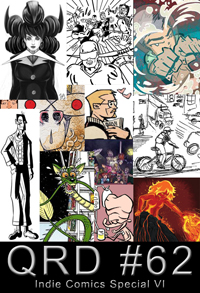
 |
| about
this issue Indie Comic Creator Interviews: Jay Payne Steven Myers William Dean Blankenship, Jr Ted Intorcio Lucas Herr Troy-Jeffrey Allen Jeff Gibbons Brian Hagen Nils Balls Eric Grissom Eric Ratcliffe Steve Peters |
 |
 |
 |
 |
 |
 |
 |
|
|
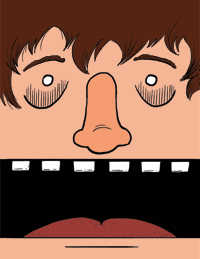 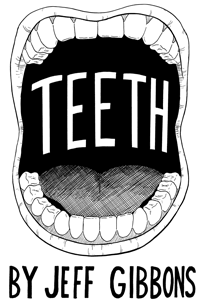 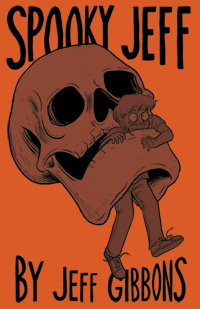 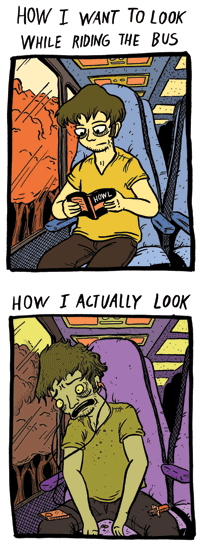 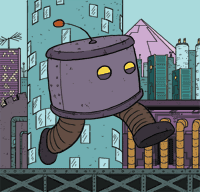 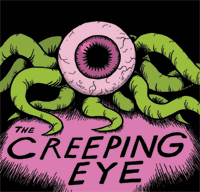 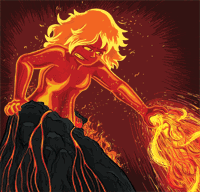 |
May 2013
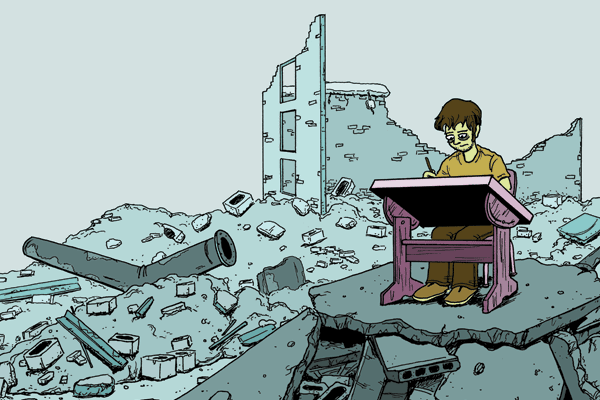
City: Toledo, OH
Comics: Pretty Jeff
Websites: www.prettyjeff.com, www.prettyjeff.tumblr.com, www.cowboyhouseinternet.com
QRD – How old were you when you first got into comics & did you always stick with them or did you come back to them?
Jeff – When I was in grade school, we had a small library that had a bunch of Garfield & Ed Emberley drawing books that I would check out all the time. For the most part, I’ve stuck with comics my whole life, but the type of comics I stuck with varies. Early on, I read a lot of syndicated comics & actually taped a bunch of comics cut from the newspaper on my bedroom wall. As a teenager, I got into books like Hsu & Chan by Norm Scott & some manga. It wasn’t until college when I really got serious & started reading a lot of comics, including Blankets by Craig Thompson, Watchmen by Alan Moore & Dave Gibbons (no relation), & the Scott McCloud books.
QRD – What was the first comic book you ever bought?
Jeff – Probably Dilbert: Words You Don’t Want To Hear During Your Annual Performance Review. Weirdly, I have two copies of the book, & I have no idea why.
QRD – How old were you when you put out your first comic?
Jeff – I’m not entirely sure, but I actually found one of my older comics & posted it online here http://www.prettyjeff.com/?p=186
QRD – Why comics instead of just writing or drawing?
Jeff – I like being able to tell stories, but I struggled with describing how characters & locations looked. I used to take a more literal approach in imagery (“the man wore a brown hat with black socks & a blue suit”) instead of describing a person in a way that helps with characterization. But I think another reason I chose comics over writing or drawing is because of animation. I love watching shows like Adventure Time or Batman: The Animated Series, but I don’t have the patience for drawing each & every frame (sometimes I barely have the patience for drawing each panel in a comic). When I read or draw a comic, there’s a sort of energy & momentum I feel in moving from one panel to the next, like watching dominos fall one by one.
QRD – Do you see mini-comics & indie comics as paths to mainstream comics or as their own unique media?
Jeff – Why can’t it be both? I think anyone who wants to eventually work in mainstream comics should produce their own indie comics to perfect their craft & get some feedback, but I also think that mini-comics provide a unique avenue for experimental or short-form comics that wouldn’t translate to larger print runs.
QRD – How many copies of your comic do you print in your first run?
Jeff – I keep my print runs short since I primarily sell my comics at SPACE & other conventions. Although I do have some comics available for purchase at Vault of Midnight in Ann Arbor, MI if anyone is interested.
QRD – How much do you think comics should cost?
Jeff – Enough that you’re making some money back. I once heard Alec Longstreth say that you don’t make money at conventions & you’re lucky to break even. I would say that production costs should account for a third of your selling price & you should keep in mind that you will not sell your entire stock.
QRD – Do you think stories should be serialized or delivered as complete works?
Jeff – It depends on the story. With a serialized story, you need to account for long breaks between issue releases & new readers who may not want to start with issue #1. I love buying Adventure Time comics because the main story arc is fairly self-contained in each issue, but they also include a stand-alone comic at the end of each issue. By contrast, I would like to read the new Batman comics by Snyder & Capullo, but I tend to wait until the collection is released & just put a bucket on my head whenever a comic news blog talks about the latest issue.
QRD – How are comic strips different than comic books & which medium do you prefer?
Jeff – Again, it depends on the story. I like comic strips for telling quick jokes or making short but powerful statements on themes like the impermanence of life or dealing with social anxieties. But I prefer comic books for longer stories with themes that I can’t distill down to four panels.
QRD – What do you do better with your comics now than when you first started?
Jeff – Writing, drawing, editing in Photoshop, posting them online, etc.
QRD – Do you do thumbnails?
Jeff – Not so much nowadays since I mostly draw comics digitally.
QRD – At what size do you draw?
Jeff – Most of my work is created digitally at 600 dpi, but with TEETH, I drew the comic at 15” x 9” so I could use a brush pen.
QRD – What kind of pens do you use?
Jeff – Microns, a Copic brush pen, & a couple Sharpies when I work traditionally. For my digital stuff, I use a Wacom Bamboo tablet with Photoshop.
QRD – What does your workstation look like?
Jeff – Sticky notes everywhere.
QRD – At what point in the artistic process do you work digitally?
Jeff – If I’m drawing the comic on paper, I’ll use Photoshop to correct any mistakes & to alter the image so the blacks are solid. I used to draw the comic on paper & then letter it digitally, but that became too confusing since any panel I drew had to account for the imaginary dialogue boxes.
QRD – What do you think of digital comics & webcomics?
Jeff – I like them. I’ve been posting webcomics for a while & I’ve seen some really cool comics online. & while it is true that you can get some good exposure by posting your comics online, it is a bit troublesome when everyone else is thinking the exact same thing.
QRD – Do you prefer working in color or black & white?
Jeff – I prefer printing in black & white because it’s way cheaper, but I love working in color.
QRD – What comic book person would you be most flattered to be compared to?
Jeff – Kermit the Frog.
QRD – What do your friends & family think of your comics?
Jeff – All my friends really like my comics, & if they don’t like them, THEN THEY’RE NOT MY FRIENDS ANYMORE. (Just kidding, of course).
QRD – What do you think of superheroes?
Jeff – I’ve been getting more interested in superheroes lately. I think I like the ideas behind some superheroes, but sometimes I don’t like the execution of their stories. Like I said earlier about serialization, I like stories that account for delays between issues & it doesn’t feel like watching 15 minutes of a movie & then waiting a month for the next 15 minutes.
QRD – Marvel or DC?
Jeff – Vanilla or chocolate? It depends on what I feel like eating. Sometimes I like eating vanilla for its fantastic rogues gallery, but get a little put-off when they change the formula every few years. Sometimes I like eating chocolate for its relatable heroes & fairly well-crafted universe, but end up disappointed when the chocolate only fights evil robots or giant lizards.
QRD – Ideally would you self-publish?
Jeff – I would prefer to work with a publisher, but I do like the control self-publishing allows & I think Kickstarter is making self-publishing a less harrowing experience. You don’t have to spend $5000 & hope that your readers buy your book; your readers have already paid for the book in advance.
QRD – What conventions do you try to attend & why?
Jeff – So far, I’ve only exhibited at SPACE in Columbus & the Pittsburgh Zine Fair, but I’m slowly adding more conventions to my list. I exhibited at Kids Read Comics in Ann Arbor last year & I’m planning on exhibiting there again this summer. I am also exhibiting at SPX this year with Jono (www.demophon.tumblr.com), & I’m hoping to attend Chicago Con this year as well. I also plan on exhibiting in Pittsburgh at either PIX or the Zine Fair.
QRD – What do you do to promote your books?
Jeff – Tell people about my webcomic, exhibit at conventions & hand out postcards with my web address on them, put my website on the inside cover of every mini-comic I make, etc. There’s definitely more I could do.
QRD – Do you think your comics are well suited to comic shops or would sell better elsewhere?
Jeff – Depends on the comic shop. Vault of Midnight in Ann Arbor, MI has some of my comics for sale, but the comic shops in Toledo don’t carry comics that aren’t from Diamond Distributors or major publishers.
QRD – What other medium would you like to see some of your comics made into (television, film, games, action figures, etc.)?
Jeff – I think I would like to see some of my comics made into a video game. Pretty Jeff would be like an indie adventure game where you have to find solutions to bizarre yet personal problems. I also made a Homestuck-style comic a few years ago called Fencing Club Adventures (www.prettyjeff.com/fencingclub) that could be adapted as an turn-based RPG or a fighting game with better art & a coherent storyline.
QRD – Do you consider yourself a comic collector or a comic reader or both?
Jeff – I consider myself a comic reader, but I have a weird habit of buying books & never reading them. In my mind I think “I’ll read these tomorrow” & then I never do. Some of these books include From Hell by Alan Moore & a bunch of Bravest Warriors comics. I dunno, maybe I’ll read some of these comics tomorrow.
QRD – What do you see as the most viable mediums for comics distribution 10 years from now?
Jeff – While everyone is thinking digital distribution is the future of comics, I’m not totally convinced. One problem I have with digital distribution is Comixology restricting consumers from downloading the comics they bought & stating in their terms of use that: “Digital Content is licensed, not sold, to you by comiXology. ComiXology reserves the right to revoke your license to Digital Content at any time for any reason.” & the problem with this is that Comixology is the biggest digital distributor for comics. But even if Comixology changes their terms of use, I think there will still be a demand for print comics.
QRD – What would you like to see more people doing with comics?
Jeff – I think there’s a lot of cool stuff out there already, & I would love to see more.
QRD – Anything else?
Jeff – I’m part of an artist collective called COWBOY HOUSE at www.cowboyhouseinternet.com, where I post stuff with my best buds Fred Frances, Matt Glove, & Mike “Snakes” Madsen. You should go there right now & check out all our cool stuff.
